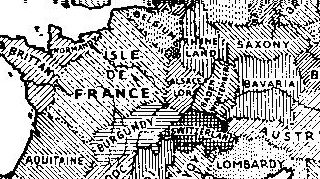19 – A Europe of ‘little states’

One last map by Leopold Kohr, also an addendum to his book ‘The Breakdown of Nations’ (1957). Kohr probably realised that dividing Europe into rectangular, US-style states would clash with the ‘tribal’ makeup of the Old Continent’s culturally diverse peoples. So he modified that idea to propose a European federation of ‘little states’: still too small to cause harm, but more in line with Europe’s ethnic composition.

Some states are small enough to continue undivided: Eire, Portugal, all 5 Scandinavian countries, the 3 Baltic countries (which weren’t yet independent at that time), the Netherlands and Belgium (is Luxembourg too small for this map, or has it been absorbed by Belgium?), Austria, Hungary, Albania, Greece, Bulgaria and Switzerland. The bigger European states are divvied up along not unfamiliar lines:





